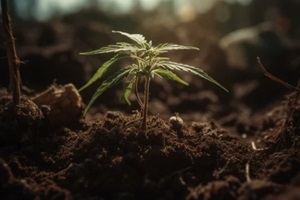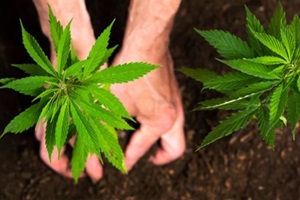 Improving cannabis soil health is essential for growing healthy and robust plants. This article focuses on the significant contributions of beneficial microorganisms — particularly ectomycorrhizal fungi and beneficial bacteria — in cannabis soil.
Improving cannabis soil health is essential for growing healthy and robust plants. This article focuses on the significant contributions of beneficial microorganisms — particularly ectomycorrhizal fungi and beneficial bacteria — in cannabis soil.
These essential microorganisms are essential for enhancing nutrient uptake, boosting plant immunity, and improving soil structure. By forming symbiotic relationships with cannabis roots, they play a key role in the overall health and productivity of the plants.
We’re going to explore how leveraging these beneficial microbes can lead to more effective and sustainable cannabis cultivation, resulting in stronger plants and better yields.
We’ll also provide key insights into the practical benefits of soil microbiology for cannabis growers to help highlight the importance of fostering a healthy soil ecosystem.
Understanding The Role of Soil Microbiomes in Cannabis Cultivation
When it comes to cannabis cultivation, the soil microbiome is a complex network of microorganisms, including bacteria, fungi, and other tiny life forms, which interact with plant roots. This interaction is not just a matter of coexistence; it’s a sophisticated relationship where both parties benefit.
For instance, mycorrhizal fungi, a type of beneficial fungi, extend their hyphae (fungus filaments) far into the soil to increase the root system’s reach, which helps the plant absorb water and nutrients, particularly phosphorus, more efficiently than roots alone.
Beneficial bacteria also play an essential role in cannabis soil, and some bacteria can actively fix nitrogen from the atmosphere, converting it into a form that plants can absorb.
Others produce natural antibiotics that protect roots from pathogens or release enzymes that help break down organic matter into nutrients. The diversity of these microorganisms is key; each species contributes uniquely to soil health and plant growth.
Enhancing Nutrient Uptake and Soil Structure
One of the primary advantages of having a healthy cannabis soil microbiome is the benefit of enhanced nutrient uptake.
Mycorrhizal fungi increase the surface area for absorption, allowing the cannabis plant to access nutrients that are otherwise out of reach. They can also store nutrients and release them slowly to help ensure your plants get what they need when needed.
This symbiosis is particularly beneficial in low-nutrient soils, where fungi can make a significant difference in the plant’s growth and yield.
In addition to nutrient uptake, they can help improve the soil’s structure by producing substances such as glomalin, which binds soil particles together, improving water retention and aeration. This change in the soil creates a more hospitable environment for roots, encouraging deeper and more extensive root systems.
Ultimately, well-structured cannabis soil also reduces erosion and runoff, helping to maintain soil health over time.
Combating Pathogens and Pests
 Another essential function of beneficial microbes is their fundamental role in disease and pest management. Certain bacteria and fungi produce compounds that are toxic to common cannabis pathogens and pests. These natural biocontrol agents can reduce the need for chemical pesticides and fungicides, which is particularly important for organic cannabis cultivation.
Another essential function of beneficial microbes is their fundamental role in disease and pest management. Certain bacteria and fungi produce compounds that are toxic to common cannabis pathogens and pests. These natural biocontrol agents can reduce the need for chemical pesticides and fungicides, which is particularly important for organic cannabis cultivation.
Harmful microorganisms such as Erwinia amylovora and Xanthomonas campestris can cause diseases that manifest as staining, mosaic symptoms, and abnormal growths, undermining the health and yield of the plants.
Mycorrhizal fungi, for instance, can help shield roots from these harmful fungi and bacteria. They form a physical barrier around roots and release chemicals that suppress pathogen growth.
Similarly, some cannabis soil bacteria produce antibiotics that target specific plant pathogens, providing a natural line of defense against diseases.
Implementing Beneficial Microbes in Cannabis Cultivation
For cannabis growers looking to leverage the benefits of cannabis soil microbes, there are several strategies. One approach is to use microbial inoculants, which are products containing beneficial microorganisms.
These can be applied to your cannabis soil or roots during planting. It’s important to choose the right type of inoculant for the specific cannabis soil conditions and cannabis strain.
Another method is to encourage the natural growth of beneficial microbes, which you can achieve through practices such as composting, which adds organic matter and nutrients to the soil, creating an ideal environment for microbial growth.
Cover cropping is also an effective practice; certain crops can increase the population of beneficial microbes in the cannabis soil.
The Future of Cannabis Soil Health
Looking forward, the integration of beneficial microbes into cannabis cultivation is set to play an increasingly vital role. With ongoing research into soil microbiology, new strains of beneficial bacteria and fungi are being identified and utilized.
Additionally, there’s a growing emphasis on sustainable cultivation practices that rely on natural processes, such as the use of beneficial microbes to improve plant health and yield.
Genetic and soil science advancements are also helping growers tailor their use of microbes more precisely. This precision agriculture approach allows for optimizing soil conditions for specific cannabis strains, leading to even better growth outcomes.
These microorganisms’ subtle yet powerful influence on cannabis cultivation simply cannot be overstated. A deep understanding of the beneficial fungi and bacteria, coupled with awareness of harmful species, is essential for maintaining a healthy cannabis crop.
Through managing this delicate balance of plant life, growers can better harness the full potential of the soil microbiome, leading to robust plant growth and bountiful yields.
Reach Out to the Northern Virginia Cannabis Soil Experts
 When you’re growing cannabis, what’s going on in your cannabis soil is important; it’s all about the good and bad microbes down there. If you manage to get the balance right with beneficial fungi and bacteria, your cannabis plants will thank you with better growth, bigger yields, and fewer diseases or problems.
When you’re growing cannabis, what’s going on in your cannabis soil is important; it’s all about the good and bad microbes down there. If you manage to get the balance right with beneficial fungi and bacteria, your cannabis plants will thank you with better growth, bigger yields, and fewer diseases or problems.
However, if harmful microbes take over, you could have serious problems down the road. The bottom line here is simply this: knowing your soil’s microbial mix can make a big difference in the ultimate success of what you grow.
If you need the right soil to get your cannabis plants popping, Dirt Connections has what you need, offering an array of specialized biomix soils that cater to the unique needs of cannabis plants. These soils are rich in beneficial microbes to help your plants thrive in the healthiest environment possible.
If you’re in Virginia, connect with Dirt Connections at 1 (703) 940-9949 or in Maryland at 1 (301) 691-3215. You can also visit Dirt Connections online for more information about their selection of biomix soils.
Summary

Dirt Connections was started with one goal in mind: providing quality residential and commercial construction services to clients on time and on budget. Reach out for more information on how we can support your next project.
For your convenience our estimates are free and by appointment. Call 703-940-9949 for a free estimate today!










































